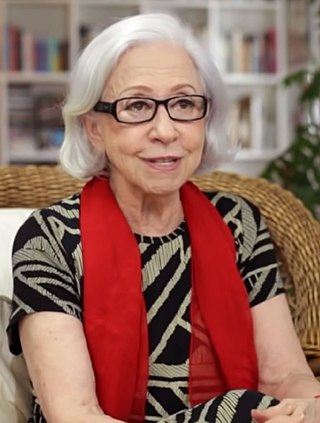
Arlette Pinheiro Esteves TorresONM, known by her stage name Fernanda Montenegro, is a Brazilian stage, television and film actress. Considered by many the greatest Brazilian actress of all time, she is often referred to as the grande dame of Brazilian theater, cinema, and performing arts. For her work in Central Station (1998), she became the first, and to date the only, Brazilian nominated for the Academy Award for Best Actress, as well as the first and only actress nominated for an Academy Award for a performance in a Portuguese language film. In addition, she was the first Brazilian to win the International Emmy in the category of Best Actress for her performance in Sweet Mother (2013).
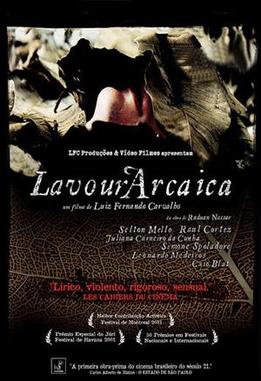
To the Left of the Father is a 2001 Brazilian drama film produced, written, directed and edited by Luiz Fernando Carvalho, based on the novel of the same name by Raduan Nassar. The film follows a man who returns to his father's home after many years and falls in love with his sister. In 2015, the Brazilian Film Critics Association (Abraccine) placed To the Left of the Father among their list of 100 Greatest Brazilian Films of All Time.
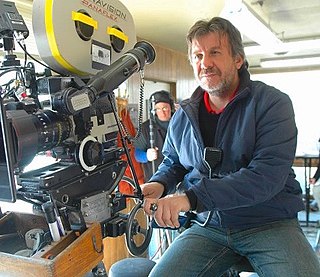
Alejandro Agresti is an Argentine film director, writer and producer. A prominent filmmaker in his country, he also directed The Lake House with Hollywood actors Sandra Bullock and Keanu Reeves in 2006.
The Mar del Plata International Film Festival is an international film festival that takes place every November in the city of Mar del Plata, Argentina. It is the only competitive feature festival recognized by the FIAPF in Latin America, and the oldest in this category in the Americas. The festival is organized by the National Institute of Cinema and Audiovisual Arts (INCAA).
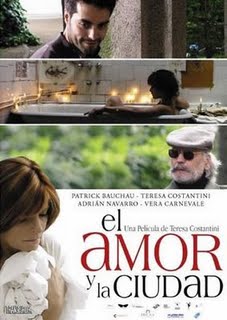
El amor y la ciudad is a 2006 Argentine romantic drama film written and directed by María Teresa Costantini. It premiered at the Mar del Plata International Film Festival in Argentina on 10 March 2006.
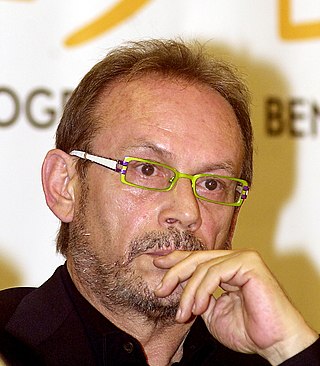
José Wilker Almeida was a Brazilian film, stage, and television actor and director. The actor gained fame in telenovelas like Roque Santeiro (1985), but became known internationally for his role as Vadinho, the husband who returns from the dead to tempt Sônia Braga's character in the movie Dona Flor and Her Two Husbands (1976).

The Brazil national under-20 football team, also known as Brazil Sub-20 or Seleção Sub-20, represents Brazil in association football at this age level and is controlled by the Brazilian Football Confederation (CBF).
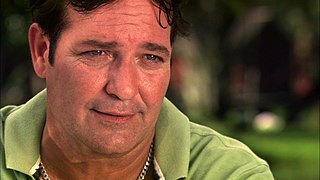
Jorge Perugorría Rodríguez is a Cuban actor, film director and painter. He is well known for his part as Diego in Strawberry and Chocolate (original title in Spanish Fresa y chocolate. He recently acted in Steven Soderbergh's Che, with Benicio del Toro and in the original Netflix series Four Seasons in Havana. He lives in Santa Fe, a neighborhood on the outskirts of Havana, with his wife Elsa Maria Fuentes de La Paz and their four children.

Chilean cinema refers to all films produced in Chile or made by Chileans. It had its origins at the start of the 20th century with the first Chilean film screening in 1902 and the first Chilean feature film appearing in 1910. The oldest surviving feature is El Húsar de la Muerte (1925), and the last silent film was Patrullas de Avanzada (1931). The Chilean film industry struggled in the late 1940s and in the 1950s, despite some box-office successes such as El Diamante de Maharajá. The 1960s saw the development of the "New Chilean Cinema", with films like Three Sad Tigers (1968), Jackal of Nahueltoro (1969) and Valparaíso mi amor (1969). After the 1973 military coup, film production was low, with many filmmakers working in exile. It increased after the end of the Pinochet regime in 1989, with occasional critical and/or popular successes such as Johnny cien pesos (1993), Historias de Fútbol (1997) and Gringuito (1998).
Rivotrill is a Brazilian instrumental group formed by Junior Crato, Rafa Duarte (bass) and Lucas dos Prazeres (percussion), which presents a fusion of Brazilian, Latin and African rhythms with progressive rock and jazz.

The Huelva Ibero-American Film Festival, held since 1975 in Huelva, Spain, is the oldest film festival in Europe dedicated to the Ibero-American cinema.

The Forbidden Education is an independent documentary released in 2012. The film documents diverse alternative education practices and unconventional schools in Latin America and Spain and includes educational approaches such as popular education, Montessori, progressive education, Waldorf, homeschooling.

Eles Não Usam Black-tie is a 1981 Brazilian drama film directed by Leon Hirszman, based on Gianfrancesco Guarnieri's play of the same name.

Amor à Vida is a Brazilian telenovela created by Walcyr Carrasco. It premiered on 20 May 2013 on TV Globo in the 9 pm timeslot and ended on 31 January 2014. It is directed by Wolf Maya and Mauro Mendonça Filho.

Things as They Are is a 2012 Chilean film directed and written by Fernando Lavanderos and filmed in Santiago, Chile. It premiered in Chile at the 2012 Festival Internacional de Viña del Mar and internationally at the Festival Internacional de Cine de Mar del Plata in Argentina.

Love and Co is a 1998 Brazilian-Portuguese comedy-drama film directed by Helvécio Ratton. Based on Eça de Queiroz's novel Alves & Cia, it stars Marco Nanini, Patricia Pillar and Alexandre Borges. Shot in São João Del Rei, Minas Gerais, and set in the 19th century, it follows Alves (Nanini) as he finds his wife Ludovina (Pillar) with Machado (Borges), and challenges him for a gun duel.

Forbidden to Forbid is a 2006 Brazilian-Chilean-Spanish drama film directed by Jorge Durán. It stars Caio Blat, Maria Flor and Alexandre Rodrigues as teenagers in a love triangle.

Better Days Ahead is a 1989 Brazilian comedy-drama film directed by Carlos Diegues.

Lúcia Murat is a Brazilian filmmaker.

Susana Schnarndorf Ribeiro is a Brazilian Paralympic swimmer. In 2005, after a lengthy triathlon career, at the age of 37, Schnarndorf began to experience the first symptoms of a mysterious degenerative disease that was later diagnosed as multiple system atrophy (MSA). After a break from professional athletics, Schnarndorf returned to the sports world as a swimmer and is presently a member of the Brazilian Paralympic Swimming Team.


















